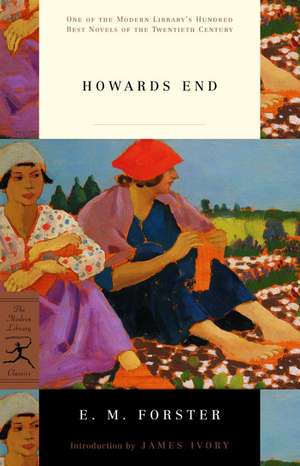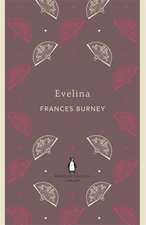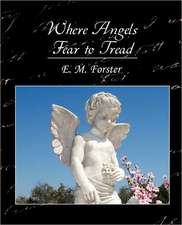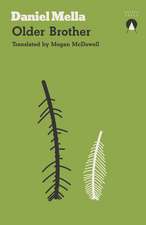Howards End: Modern Library
Autor E. M. Forsteren Limba Engleză Paperback – 2000
First published in 1910, Howards End is the novel that earned E. M. Forster recognition as a major writer. Soon to be a limited series on Starz.
At its heart lie two families--the wealthy and business-minded Wilcoxes and the cultured and idealistic Schlegels. When the beautiful and independent Helen Schlegel begins an impetuous affair with the ardent Paul Wilcox, a series of events is sparked--some very funny, some very tragic--that results in a dispute over who will inherit Howards End, the Wilcoxes' charming country home. As much about the clash between individual wills as the clash between the sexes and the classes, Howards End is a novel whose central tenet, Only connect, remains a powerful prescription for modern life. Introduction by Alfred Kazan(Book Jacket Status: Not Jacketed)
| Toate formatele și edițiile | Preț | Express |
|---|---|---|
| Paperback (23) | 44.66 lei 21-33 zile | +18.83 lei 6-12 zile |
| Penguin Books – 27 iun 2012 | 44.66 lei 21-33 zile | +18.83 lei 6-12 zile |
| CreateSpace Independent Publishing Platform – | 50.13 lei 3-5 săpt. | |
| Penguin Books – 26 apr 2000 | 58.13 lei 21-33 zile | +36.39 lei 6-12 zile |
| West Margin Press – 16 dec 2020 | 69.25 lei 3-5 săpt. | +13.47 lei 6-12 zile |
| Vintage Books USA – 28 feb 1989 | 73.31 lei 3-5 săpt. | |
| KUPERARD (BRAVO LTD) – 2000 | 80.41 lei 3-5 săpt. | |
| – | 87.37 lei 3-5 săpt. | |
| CreateSpace Independent Publishing Platform – 2 dec 2015 | 88.34 lei 3-5 săpt. | |
| CREATESPACE – | 88.59 lei 3-5 săpt. | |
| CREATESPACE – | 94.16 lei 3-5 săpt. | |
| EMPIRE BOOKS – 31 dec 2011 | 97.84 lei 3-5 săpt. | |
| CREATESPACE – | 98.69 lei 3-5 săpt. | |
| CREATESPACE – | 98.94 lei 3-5 săpt. | |
| – | 101.16 lei 3-5 săpt. | |
| CREATESPACE – | 134.86 lei 3-5 săpt. | |
| – | 89.95 lei 6-8 săpt. | |
| Serenity Publishers, LLC – 31 oct 2008 | 106.46 lei 6-8 săpt. | |
| Aegypan Press – 28 feb 2007 | 120.65 lei 6-8 săpt. | |
| Indoeuropeanpublishing.com – 9 aug 2018 | 121.73 lei 6-8 săpt. | |
| Echo Library – | 125.88 lei 38-45 zile | |
| NuVision Publications – 22 mai 2008 | 141.08 lei 38-45 zile | |
| Delhi Open Books – iul 2020 | 164.83 lei 6-8 săpt. | |
| Egoist Press – 29 aug 2018 | 179.42 lei 6-8 săpt. | |
| Hardback (6) | 82.70 lei 21-33 zile | +33.57 lei 6-12 zile |
| EVERYMAN – 26 noi 1992 | 82.70 lei 21-33 zile | +33.57 lei 6-12 zile |
| Hodder & Stoughton – 11 noi 2010 | 91.99 lei 3-5 săpt. | +45.97 lei 6-12 zile |
| Mint Editions – 19 apr 2021 | 134.21 lei 3-5 săpt. | |
| Everyman's Library – 31 oct 1991 | 142.71 lei 3-5 săpt. | +35.11 lei 6-12 zile |
| Indoeuropeanpublishing.com – 8 aug 2018 | 210.69 lei 6-8 săpt. | |
| Aegypan Press – 31 ian 2007 | 218.94 lei 6-8 săpt. |
Din seria Modern Library
- 17%
 Preț: 51.00 lei
Preț: 51.00 lei -
 Preț: 115.91 lei
Preț: 115.91 lei -
 Preț: 119.77 lei
Preț: 119.77 lei - 15%
 Preț: 72.40 lei
Preț: 72.40 lei -
 Preț: 149.11 lei
Preț: 149.11 lei -
 Preț: 162.79 lei
Preț: 162.79 lei -
 Preț: 73.11 lei
Preț: 73.11 lei -
 Preț: 136.89 lei
Preț: 136.89 lei -
 Preț: 58.08 lei
Preț: 58.08 lei -
 Preț: 86.32 lei
Preț: 86.32 lei -
 Preț: 98.78 lei
Preț: 98.78 lei -
 Preț: 140.42 lei
Preț: 140.42 lei -
 Preț: 98.19 lei
Preț: 98.19 lei -
 Preț: 48.27 lei
Preț: 48.27 lei - 7%
 Preț: 38.09 lei
Preț: 38.09 lei -
 Preț: 100.01 lei
Preț: 100.01 lei -
 Preț: 94.64 lei
Preț: 94.64 lei -
 Preț: 110.95 lei
Preț: 110.95 lei -
 Preț: 108.87 lei
Preț: 108.87 lei -
 Preț: 82.70 lei
Preț: 82.70 lei -
 Preț: 119.81 lei
Preț: 119.81 lei -
 Preț: 109.91 lei
Preț: 109.91 lei -
 Preț: 148.91 lei
Preț: 148.91 lei - 27%
 Preț: 116.00 lei
Preț: 116.00 lei -
 Preț: 58.57 lei
Preț: 58.57 lei -
 Preț: 147.67 lei
Preț: 147.67 lei -
 Preț: 150.15 lei
Preț: 150.15 lei -
 Preț: 106.20 lei
Preț: 106.20 lei -
 Preț: 111.57 lei
Preț: 111.57 lei -
 Preț: 109.86 lei
Preț: 109.86 lei -
 Preț: 153.86 lei
Preț: 153.86 lei -
 Preț: 121.68 lei
Preț: 121.68 lei -
 Preț: 62.34 lei
Preț: 62.34 lei -
 Preț: 115.50 lei
Preț: 115.50 lei - 21%
 Preț: 71.06 lei
Preț: 71.06 lei - 15%
 Preț: 48.95 lei
Preț: 48.95 lei - 8%
 Preț: 74.28 lei
Preț: 74.28 lei -
 Preț: 136.52 lei
Preț: 136.52 lei -
 Preț: 101.90 lei
Preț: 101.90 lei -
 Preț: 104.81 lei
Preț: 104.81 lei -
 Preț: 170.84 lei
Preț: 170.84 lei -
 Preț: 117.94 lei
Preț: 117.94 lei -
 Preț: 138.69 lei
Preț: 138.69 lei -
 Preț: 154.31 lei
Preț: 154.31 lei - 31%
 Preț: 104.30 lei
Preț: 104.30 lei -
 Preț: 100.22 lei
Preț: 100.22 lei -
 Preț: 68.45 lei
Preț: 68.45 lei -
 Preț: 70.55 lei
Preț: 70.55 lei -
 Preț: 161.08 lei
Preț: 161.08 lei
Preț: 80.41 lei
Nou
15.39€ • 16.06$ • 12.73£
Carte disponibilă
Livrare economică 14-28 martie
Specificații
ISBN-10: 0375753761
Pagini: 368
Dimensiuni: 134 x 201 x 20 mm
Greutate: 0.31 kg
Ediția:Mod Lib PB.
Editura: KUPERARD (BRAVO LTD)
Seria Modern Library
Notă biografică
Descriere
Howards End (1910) is a novel by English author E.M. Forster. Inspired by his interactions with the famous Bloomsbury Group of writers and intellectuals, as well as by his personal experience growing up with a large inheritance on the family estate of Rooks Nest, Howards End has been recognized as one of the finest novels ever written in English. The story loosely follows the lives of three families: the Wilcoxes, whose wealth derives from the exploitation of British colonies; the Basts, an impoverished couple; and the Schlegels, half-German sisters who find themselves set between the vastly opposing classes of their peers. Much of the novel is set on the Wilcox estate, known as Howards End, a symbol of fortune and a reminder of the generational implications of hoarded wealth. When Ruth Wilcox moves to London, she befriends her neighbor Margaret Schlegel. On her deathbed, and in secret, Ruth leaves a note instructing that Howards End be left to Margaret in her will, bypassing her family entirely. When her son Henry, a widower, finds out, he destroys the note, ensuring that the estate remains within the family. Years later, when the two meet again, Henry proposes to Margaret, bringing the Wilcox and Schlegel families closer together. But when her sister Helen brings the struggling Leonard and Jacky Bast to a party at Howards End, Henry, who recognizes Jacky as a former mistress, believes he is being set up, and breaks off the engagement. Although they reconcile, Margaret is driven apart from her sisters, who resent the Wilcoxes and distrust Henry. But when Helen becomes pregnant by Leonard, and a tragic event destroys several lives, the families are brought together once more, and both Margaret and Henry are forced to choose between the fortune they stand to gain and the love they stand to lose. E.M. Forster's Howards End is a masterpiece, a brilliant study of family, wealth, romance, and secrecy that captures the depravity of the English aristocracy without losing what sets it apart--an undeterred sense of humanity. With a beautifully designed cover and professionally typeset manuscript, this edition of E.M. Forster's Howards End is a classic of English literature reimagined for modern readers.
Recenzii
Commentary by Virginia Woolf, Lionel Trilling, Malcolm Bradbury, and Joseph Epstein
"Howards End is a classic English novel . . . superb and wholly cherishable . . . one that admirers have no trouble reading over and over again," said Alfred Kazin.
First published in 1910, Howards End is the novel that earned E. M. Forster recognition as a major writer. At its heart lie two families—the wealthy and business-minded Wilcoxes and the cultured and idealistic Schlegels. When the beautiful and independent Helen Schlegel begins an impetuous affair with the ardent Paul Wilcox, a series of events is sparked—some very funny, some very tragic—that results in a dispute over who will inherit Howards End, the Wilcoxes' charming country home. As much about the clash between individual wills as the clash between the sexes and the classes, Howards End is a novel whose central tenet, "Only connect," remains a powerful prescription for modern life.
"Howards End is undoubtedly Forster's masterpiece; it develops to their full the themes and attitudes of [his] early books and throws back upon them a new and enhancing light," wrote the critic Lionel Trilling.
Extras
ONE MAY as well begin with Helen's letters to her sister.
Howards End,
Tuesday.
Dearest Meg,
It isn't going to be what we expected. It is old and little, and altogether delightful—red brick. We can scarcely pack in as it is, and the dear knows what will happen when Paul (younger son) arrives tomorrow. From hall you go right or left into dining-room or drawing-room. Hall itself is practically a room. You open another door in it, and there are the stairs going up in a sort of tunnel to the first-floor. Three bed-rooms in a row there, and three attics in a row above. That isn't all the house really, but it's all that one notices—nine windows as you look up from the front garden.
Then there's a very big wych-elm—to the left as you look up—leaning a little over the house, and standing on the boundary between the garden and meadow. I quite love that tree already. Also ordinary elms, oaks—no nastier than ordinary oaks—pear-trees, apple-trees, and a vine. No silver birches, though. However, I must get on to my host and hostess. I only wanted to show that it isn't the least what we expected. Why did we settle that their house would be all gables and wiggles, and their garden all gamboge-coloured paths? I believe simply because we associate them with expensive hotels—Mrs. Wilcox trailing in beautiful dresses down long corridors, Mr. Wilcox bullying porters, etc. We females are that unjust.
I shall be back Saturday; will let you know train later. They are as angry as I am that you did not come too; really Tibby is too tiresome, he starts a new mortal disease every month. How could he have got hay fever in London? and even if he could, it seems hard that you should give up a visit to hear a schoolboy sneeze. Tell him that Charles Wilcox (the son who is here) has hay fever too, but he's brave, and gets quite cross when we inquire after it. Men like the Wilcoxes would do Tibby a power of good. But you won't agree, and I'd better change the subject.
This long letter is because I'm writing before breakfast. Oh, the beautiful vine leaves! The house is covered with a vine. I looked out earlier, and Mrs. Wilcox was already in the garden. She evidently loves it. No wonder she sometimes looks tired. She was watching the large red poppies come out. Then she walked off the lawn to the meadow, whose corner to the right I can just see. Trail, trail, went her long dress over the sopping grass, and she came back with her hands full of the hay that was cut yesterday—I suppose for rabbits or something, as she kept on smelling it. The air here is delicious. Later on I heard the noise of croquet balls, and looked out again, and it was Charles Wilcox practising; they are keen on all games. Presently he started sneezing and had to stop. Then I hear more clicketing, and it is Mr. Wilcox practising, and then, "a-tissue, a-tissue": he has to stop too. Then Evie comes out, and does some calisthenic exercises on a machine that is tacked on to a greengage-tree—they put everything to use—and then she says "a-tissue," and in she goes. And finally Mrs. Wilcox reappears, trail, trail, still smelling hay and looking at the flowers. I inflict all this on you because once you said that life is sometimes life and sometimes only a drama, and one must learn to distinguish t'other from which, and up to now I have always put that down as "Meg's clever nonsense." But this morning, it really does seem not life but a play, and it did amuse me enormously to watch the W's. Now Mrs. Wilcox has come in.
I am going to wear [omission]. Last night Mrs. Wilcox wore an [omission], and Evie [omission]. So it isn't exactly a go-as-you-please place, and if you shut your eyes it still seems the wiggly hotel that we expected. Not if you open them. The dog-roses are too sweet. There is a great hedge of them over the lawn—magnificently tall, so that they fall down in garlands, and nice and thin at the bottom, so that you can see ducks through it and a cow. These belong to the farm, which is the only house near us. There goes the breakfast gong. Much love. Modified love to Tibby. Love to Aunt Juley; how good of her to come and keep you company, but what a bore. Burn this. Will write again
Thursday.
Helen
Howards End,
Friday.
Dearest Meg,
I am having a glorious time. I like them all. Mrs. Wilcox, if quieter than in Germany, is sweeter than ever, and I never saw anything like her steady unselfishness, and the best of it is that the others do not take advantage of her. They are the very happiest, jolliest family that you can imagine. I do really feel that we are making friends. The fun of it is that they think me a noodle, and say so—at least, Mr. Wilcox does—and when that happens, and one doesn't mind, it's a pretty sure test, isn't it? He says the most horrid things about women's suffrage so nicely, and when I said I believed in equality he just folded his arms and gave me such a setting down as I've never had. Meg, shall we ever learn to talk less? I never felt so ashamed of myself in my life. I couldn't point to a time when men had been equal, nor even to a time when the wish to be equal had made them happier in other ways. I couldn't say a word. I had just picked up the notion that equality is good from some book—probably from poetry, or you. Anyhow, it's been knocked into pieces, and, like all people who are really strong, Mr. Wilcox did it without hurting me. On the other hand, I laugh at them for catching hay fever. We live like fighting-cocks, and Charles takes us out every day in the motor—a tomb with trees in it, a hermit's house, a wonderful road that was made by the Kings of Mercia—tennis—a cricket match—bridge—and at night we squeeze up in this lovely house. The whole clan's here now—it's like a rabbit warren. Evie is a dear. They want me to stop over Sunday—I suppose it won't matter if I do. Marvellous weather and the view's marvellous—views westward to the high ground. Thank you for your letter. Burn this.
Your affectionate
Helen
Howards End,
Sunday.
Dearest, dearest Meg,—I do not know what you will say: Paul and I are in love—the younger son who only came here Wednesday.
Chapter Two
MARGARET GLANCED at her sister's note and pushed it over the breakfast-table to her aunt. There was a moment's hush, and then the flood-gates opened.
"I can tell you nothing, Aunt Juley. I know no more than you do. We met—we only met the father and mother abroad last spring. I know so little that I didn't even know their son's name. It's all so—" She waved her hand and laughed a little.
"In that case it is far too sudden."
"Who knows, Aunt Juley, who knows?"
"But, Margaret dear, I mean we mustn't be unpractical now that we've come to facts. It is too sudden, surely."
"Who knows!"
"But Margaret dear—"
"I'll go for her other letters," said Margaret. "No, I won't, I'll finish my breakfast. In fact, I haven't them. We met the Wilcoxes on an awful expedition that we made from Heidelberg to Speyer. Helen and I had got it into our heads that there was a grand old cathedral at Speyer—the Archbishop of Speyer was one of the seven electors—you know—'Speyer, Maintz, and Koln.' Those three sees once commanded the Rhine Valley and got it the name of Priest Street."
"I still feel quite uneasy about this business, Margaret."
"The train crossed by a bridge of boats, and at first sight it looked quite fine. But oh, in five minutes we had seen the whole thing. The cathedral had been ruined, absolutely ruined, by restoration; not an inch left of the original structure. We wasted a whole day, and came across the Wilcoxes as we were eating our sandwiches in the public gardens. They too, poor things, had been taken in—they were actually stopping at Speyer—and they rather liked Helen insisting that they must fly with us to Heidelberg. As a matter of fact, they did come on next day. We all took some drives together. They knew us well enough to ask Helen to come and see them—at least, I was asked too, but Tibby's illness prevented me, so last Monday she went alone. That's all. You know as much as I do now. It's a young man out of the unknown. She was to have come back Saturday, but put off till Monday, perhaps on account of—I don't know."
She broke off, and listened to the sounds of a London morning. Their house was in Wickham Place, and fairly quiet, for a lofty promontory of buildings separated it from the main thoroughfare. One had the sense of a backwater, or rather of an estuary, whose waters flowed in from the invisible sea, and ebbed into a profound silence while the waves without were still beating. Though the promontory consisted of flats—expensive, with cavernous entrance halls, full of concierges and palms—it fulfilled its purpose, and gained for the older houses opposite a certain measure of peace. These, too, would be swept away in time, and another promontory would rise upon their site, as humanity piled itself higher and higher on the precious soil of London.
Mrs. Munt had her own method of interpreting her nieces. She decided that Margaret was a little hysterical, and was trying to gain time by a torrent of talk. Feeling very diplomatic, she lamented the fate of Speyer, and declared that never, never should she be so misguided as to visit it, and added of her own accord that the principles of restoration were ill understood in Germany. "The Germans," she said, "are too thorough, and this is all very well sometimes, but at other times it does not do."
"Exactly," said Margaret; "Germans are too thorough." And her eyes began to shine.
"Of course I regard you Schlegels as English," said Mrs. Munt hastily—"English to the backbone."
Margaret leaned forward and stroked her hand.
"And that reminds me—Helen's letter—"
"Oh, yes, Aunt Juley, I am thinking all right about Helen's letter. I know—I must go down and see her. I am thinking about her all right. I am meaning to go down."
"But go with some plan," said Mrs. Munt, admitting into her kindly voice a note of exasperation. "
Margaret, if I may interfere, don't be taken by surprise. What do you think of the Wilcoxes? Are they our sort? Are they likely people? Could they appreciate Helen, who is to my mind a very special sort of person? Do they care about Literature and Art? That is most important when you come to think of it. Literature and Art. Most important. How old would the son be? She says 'younger son.' Would he be in a position to marry? Is he likely to make Helen happy? Did you gather—"
"I gathered nothing."
They began to talk at once.
"Then in that case—"
"In that case I can make no plans, don't you see."
"On the contrary—"
"I hate plans. I hate lines of action. Helen isn't a baby."
"Then in that case, my dear, why go down?"
Margaret was silent. If her aunt could not see why she must go down, she was not going to tell her. She was not going to say: "I love my dear sister; I must be near her at this crisis of her life." The affections are more reticent than the passions, and their expression more subtle. If she herself should ever fall in love with a man, she, like Helen, would proclaim it from the house-tops, but as she only loved a sister she used the voiceless language of sympathy.
"I consider you odd girls," continued Mrs. Munt, "and very wonderful girls, and in many ways far older than your years. But—you won't be offended?—frankly I feel you are not up to this business. It requires an older person. Dear, I have nothing to call me back to Swanage." She spread out her plump arms. "I am all at your disposal. Let me go down to this house whose name I forget instead of you."
"Aunt Juley"—she jumped up and kissed her—"I must, must go to Howards End myself. You don't exactly understand, though I can never thank you properly for offering."
"I do understand," retorted Mrs. Munt, with immense confidence. "I go down in no spirit of interference, but to make inquiries. Inquiries are necessary. Now, I am going to be rude. You would say the wrong thing; to a certainty you would. In your anxiety for Helen's happiness you would offend the whole of these Wilcoxes by asking one of your impetuous questions—not that one minds offending them."
"I shall ask no questions. I have it in Helen's writing that she and a man are in love. There is no question to ask as long as she keeps to that. All the rest isn't worth a straw. A long engagement if you like, but inquiries, questions, plans, lines of action—no, Aunt Juley, no."
Away she hurried, not beautiful, not supremely brilliant, but filled with something that took the place of both qualities—something best described as a profound vivacity, a continual and sincere response to all that she encountered in her path through life.
"If Helen had written the same to me about a shop-assistant or a penniless clerk—"
"Dear Margaret, do come into the library and shut the door. Your good maids are dusting the banisters."
"—or if she had wanted to marry the man who calls for Carter Paterson, I should have said the same." Then, with one of those turns that convinced her aunt that she was not mad really and convinced observers of another type that she was not a barren theorist, she added: "Though in the case of Carter Paterson I should want it to be a very long engagement indeed, I must say."
"I should think so," said Mrs. Munt; "and, indeed, I can scarcely follow you. Now, just imagine if you said anything of that sort to the Wilcoxes. I understand it, but most good people would think you mad. Imagine how disconcerting for Helen! What is wanted is a person who will go slowly, slowly in this business, and see how things are and where they are likely to lead to."
Margaret was down on this.
"But you implied just now that the engagement must be broken off."
"I think probably it must; but slowly."
"Can you break an engagement off slowly?" Her eyes lit up. "What's an engagement made of, do you suppose? I think it's made of some hard stuff, that may snap, but can't break. It is different to the other ties of life. They stretch or bend. They admit of degree. They're different."
From the Paperback edition.












